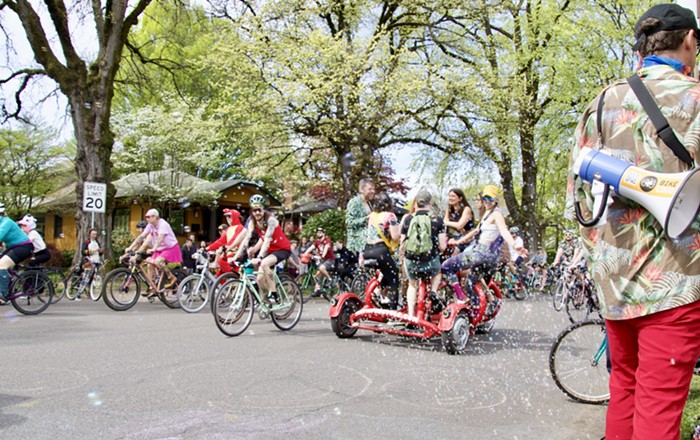Nothing in recent memory highlights the political power of bicyclists more than their response to Mayor Tom Potter's quiet decision to cut the funding for bike planning. Over the course of about a week, bicyclists managed to get organized, win back their funding, and decimate Potter's support in the biking community.
In May, Potter announced that he was defunding the city's Platinum Bicycle Master Plan in order to save the city a whopping $100,000. (To put that into perspective, that's how much the city was giving to the Portland Metro Softball Association for years—and it's a self-sufficient, private organization.) Despite the mind-numbing wonkiness of the issue, the response from the bike community was overwhelming, and the other city commissioners stepped up to refund the plan, becoming heroes.
The result: Potter, who was elected with support from bike advocates, is now persona non grata, and insiders say that if he runs for reelection, he can kiss the bike vote good-bye. At the recent Multnomah County Bike Fair, bikers handed out stickers that read, "Bud Clark is my mayor," a reference to Portland's 1980s mayor who rode his bike to work nearly every day.
In many ways, the response illustrated the evolution—and legitimacy—of bike advocacy in Portland, which, depending on who you talk to, began with Mayor Clark's daily rides, the first Bicycle Master Plan in the early '90s, bowtied Congressman Earl Blumenauer's steadfast support of bike planning and projects during his time on city council, the emergence of the Bicycle Transportation Alliance in 1990, or the scrappy efforts of Critical Mass riders throughout the last decade and a half.
Of course, it was all of those things—and more—that combined to make Portland a bike nirvana, coupled with state and federal requirements on spending for bike lanes and paths, and made possible by a strict limit on urban sprawl and Portland's neighborhood system. (It's a lot easier to be a "bike town" when you don't have to ride seven miles past strip malls and housing developments to get to the nearest grocery store.)
But no matter whom you talk to, it's universally accepted that Portland is now standing on the edge of a new biking era—and it's not entirely certain anyone knows what to do. Painting white lines on streets is no longer sufficient to get more people on bikes, with the very real result being that the vast majority of Portlanders still don't commute by bike because they think it's unsafe. (Fact: It's statistically safer than driving.) The Portland Department of Transportation still only spends a bit over one percent of its budget on bikes, despite the fact that between three and four percent of the city bikes regularly.
So what needs to happen in order for Portland to live up to its reputation? First, city government needs to nut up and overspend on bikes, with the goal of turning at least 10 to 20 percent of Portlanders into bike commuters. Second, the city needs more bike boulevards—streets that aren't technically closed off to auto traffic, but are designed specifically for bikers to use, essentially like bike freeways. Third, speed limits for cars in residential areas need to drop, and fourth, we need a plan for a network of dedicated, off-street bike paths to get bikes out of the way of cars.
Sounds easy, right? Especially given Americans' outrage over the Iraq War, concern about global warming, and the rising obesity epidemic. But bike activists will have to contend with one major obstacle (besides the overwhelming laziness of Americans), and that's the complacency that comes with having already won so many smaller battles. As someone wise once said, "Nothing wilts more quickly than laurels rested upon."
Potter's decision to cut bike funding is a shining example: He took a gamble on the complacency of bike activists, that no one would care if the Master Plan—arguably, the most important process in determining Portland's future as a bike town—simply went away. He lost that gamble, in a big way, but reaching the next step is going to take more than just an onslaught of emails; it's going to require a complete shift in the way Portlanders think about bikes. They aren't simply toys, but the quickest, easiest way to solve many of our nation's problems.
In short, the rest of the city is going to have to learn what velophiles already know—that bicycles can save the planet.













